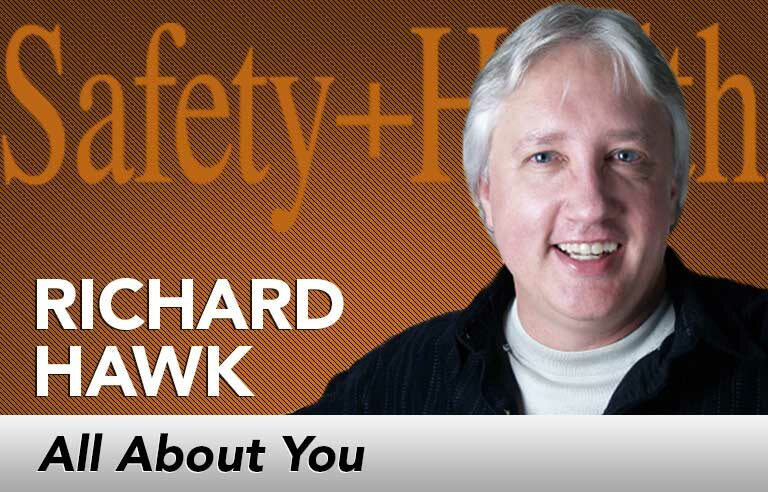All About You: Reflecting on performance leads to growth

EDITOR’S NOTE: Motivating employees to work safely is part of the safety professional’s job. But who motivates the motivator? In this monthly column, veteran safety pro and professional speaker Richard Hawk offers his entertaining brand of wisdom to inspire safety pros to perform at their best.
You probably gaze at a mirror at least once a day to check how you look. Perhaps your hair needs fixing or some aspect of your clothing needs adjusting. Or, you may decide you look fine and head out the door. Much like your image in a mirror, when you reflect on an experience, you can examine it to determine whether you should make changes.
Although some similarities exist, this type of “event reflection” is different than reflecting to become more self-aware. When you examine your drives and feelings, you’re trying to better understand yourself – particularly your desires and motivation. When you contemplate how well you performed or the reasons an event turned out the way it did, your purpose is to do better the next time and improve the outcome. When done regularly, it can help you excel in every avenue of your personal and professional life.
While returning home from a talk or consulting project, I reflect on the trip by asking myself a few questions, which can easily be adopted for your events:
- What went well and why?
- What should I remember to do next time?
- What didn’t go as well as I thought it would, and why?
- What should I remember to not do again?
- What is the most important lesson I can learn from what happened?
Most times, you learn at least one solid lesson while reflecting in this way. It’s not always pleasant because you’re not reminiscing to feel nostalgic. Instead, you’re reviewing what happened to learn what went wrong and what went right. If you interrupted someone during a meeting and realize while reflecting that you acted rudely, thinking about it won’t feel good, but it may help you avoid similar behavior in the future.
However, it’s vital that you don’t just recall what went wrong when you reflect. Pick out the good stuff, too. By reflecting on negative and positive behaviors and their results, you’re more likely to get an accurate idea of what happened and why.
One way to ensure you reflect on your experiences is to keep a journal. It doesn’t have to be extensive – brief entries can be a means to learn from your day-to-day behavior and outcomes.
Another advantage of journaling is that you can go back and look at your reflections to see how you’re doing in regard to any resolves you wrote down. It’s been shown to be cathartic, too, especially if something happened that upset you. When something negative happens to me, I find it makes the experience lose some of its emotional impact when I write about it.
If you work with a team, reflecting on a project or event such as a turnaround, an outage or new construction is essential to ensuring the next time you work together on a similar endeavor that the outcome is better – even if it was a grand success. If the team completed the project on time with excellent safety performance, reflect on why that happened. Did a few things go awry? Then spend time examining the possible reasons. Keep in mind that the purpose of this kind of reflecting isn’t to place blame, but to improve results.
Reflection can be difficult – even embarrassing – at times. It also can be uplifting. But it’s essential to our personal growth. If you make a mistake and ignore it (and its consequences), you’re likely to do it again. Likewise with a positive outcome, if you let what happened slip from your memory, you may miss the opportunity to repeat the success.
Regularly reflecting on how I could have performed better surely has helped me improve my skills as a professional speaker and consultant. It can do the same for you as a safety and health professional. Although it’s not as enjoyable as when I reflect on the times when everything went as planned, it’s vital to my growth. This type of reflecting is about learning from your ups and downs, so you can have more ups than downs.
This article represents the views of the author and should not be construed as a National Safety Council endorsement.
Richard Hawk helps safety professionals become better leaders through his keynotes, workshops, articles and books so they can create vibrant safety cultures. His popular “Mindfully Safe” keynote teaches employees how to focus better and improve their situational awareness, a key skill to preventing incidents. To contact Richard, visit makesafetyfun.com.
Direct to your inbox: Sign up to be notified in email about new "All About You" columns.
Listen on Soundcloud or Stitcher
Post a comment to this article
Safety+Health welcomes comments that promote respectful dialogue. Please stay on topic. Comments that contain personal attacks, profanity or abusive language – or those aggressively promoting products or services – will be removed. We reserve the right to determine which comments violate our comment policy. (Anonymous comments are welcome; merely skip the “name” field in the comment box. An email address is required but will not be included with your comment.)

